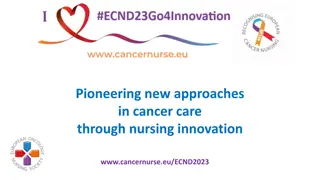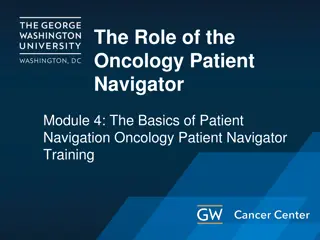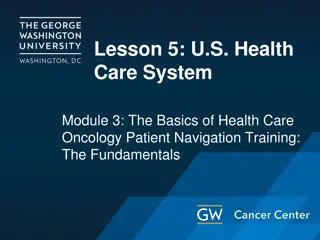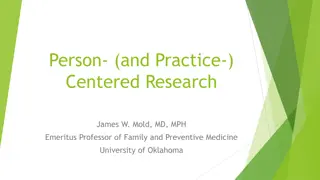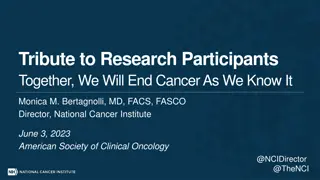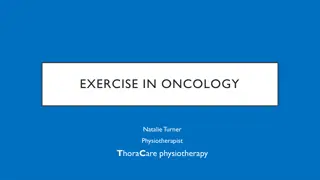Exploring Integrative Oncology and Patient-Centered Cancer Care
Integrative oncology blends conventional cancer treatments with mind-body practices, natural products, and lifestyle modifications to improve health, quality of life, and clinical outcomes. This approach empowers individuals to actively participate in their care journey, promoting overall well-being and empowerment beyond cancer treatment. The history of integrative care traces back to ancient healing traditions and has evolved to encompass a variety of complementary modalities, including yoga, acupuncture, meditation, massage therapy, and more. Recent reports highlight the increasing use of complementary and alternative medicine (CAM) in healthcare settings, driven by patient demand and recognition of clinical effectiveness.
- Integrative Oncology
- Patient-Centered Care
- Complementary Medicine
- Cancer Treatment
- Mind-Body Practices
Download Presentation

Please find below an Image/Link to download the presentation.
The content on the website is provided AS IS for your information and personal use only. It may not be sold, licensed, or shared on other websites without obtaining consent from the author. Download presentation by click this link. If you encounter any issues during the download, it is possible that the publisher has removed the file from their server.
E N D
Presentation Transcript
Integrative Care An Essential Component for Patient Quality of Life
Integrative oncology is a patient-centered, evidence-informed field of cancer care that utilizes mind and body practices, natural products, and/or lifestyle modifications from different traditions alongside conventional cancer treatments. Integrative oncology aims to optimize health, quality of life, and clinical outcomes across the cancer care continuum and to empower people to prevent cancer and become active participants before, during, and beyond cancer treatment. -Society for Integrative Oncology
A brief look at a complicated history Shamans Ayurveda- 2,500 BCE Traditional Chinese Medicine- 1,600 BCE Cartesian dualism, made famous by Rene Descartes, 1596 1650 mind and body are separate Biomedical model- Newton The Flexner Report of 1910 transformed the nature and process of medical education in America with a resulting elimination of proprietary schools and the establishment of the biomedical model as the gold standard of medical training. (Duffy) Florence Nightingale (1820-1910)- Environmental theory, relational healing Herbert Benson- 1970s Jon Kabat-Zinn- 1970s Andrew Weil- 1994
The IOM report on CAM further documented growing use of CAM. One third of American adults were using some form of CAM, with total annual visits to CAM providers exceeding visits to primary care physicians, and an estimated 15 million adults were taking herbal remedies and vitamins in addition to prescription drugs. (Maizes) The American Hospital Association found that US hospitals are increasingly adding CAM to conventional services; 37% of responding hospitals now offer one or more CAM therapies, up from 26.5% in 2005. Eighty-four percent of the hospitals indicated patient demand as the primary reason for offering the alternative therapies, while 67% stated clinical effectiveness as the main reason. (Maizes) M. D. Anderson, Dana-Farber, Memorial Sloan-Kettering, Duke, and Columbia University
Yoga Acupuncture and Chinese medicine Acupressure Meditation and mindfulness Massage therapy Reflexology Energy work (Reiki, Healing Touch, etc) Ayurveda Chiropractor Naturopathic medicine Art therapy Music therapy Aromatherapy Hypnotherapy Guided Imagery Biofeedback Breathing exercises Exercise Tai Chi Counseling/therapy Osteopathy Spiritual support This is why teamwork is so important!
An example of an Integrative Care Team: Physician (medical oncology, radiation, surgery, etc) Psychologist/counselor Nutritionist Acupuncturist Hypnotherapist/Meditation teacher/Mindfulness coach Massage Therapist Chaplain
In a multicenter study of 410 predominantly breast cancer patients using a program of breathing exercises, 18 gentle yoga postures, and meditation, significant improvements were seen in sleep quality, fatigue, and QoL. (Mustian) In the largest prospective observational study of massage therapy, researchers in a major cancer center treated 1,290 cancer patients with Swedish massage, reflexology/foot massage, or light touch massage and found clinically relevant improvement in multiple areas including pain (improved by 48%), fatigue (43%), stress/anxiety (60%), nausea (51%), and depression (36%). (Cassileth) Systematic literature review from 1990 through 2015: High levels of evidence support the routine use of mind-body practices, such as yoga, meditation, relaxation techniques and passive music therapy to address common mental health concerns among breast cancer patients, including anxiety, stress, depression, and mood disturbances. Additionally, meditation has been shown to improve quality of life and physical functioning, and yoga has been found to improve quality of life and fatigue. Massage has been shown to improve mood... Given the high level of evidence of benefit coupled with the and the relative low level of risk, these therapies can be incorporated as an option care for patients, especially when there is poor symptom control. (Greenlee, et al)
Integrative modalities used alongside conventional treatment can help create the most optimal environment for the body to utilize it s innate healing ability Whole person medicine and patient centered care- people are more than their physical body Looking at lifestyle in order to prevent disease Patient and practitioner are partners in the healing process Teamwork and coordinated care
How can Integrative Care help? Improve quality of life A recent meta-analysis using 30 randomized controlled trials from the European Organization for Research and Treatment of Cancer, which included survival data for over 10,000 patients with 11 different cancer sites found that QoL is predictive of survival. (Quinten) Symptom management Pain, fatigue, anxiety, stress, depression, insomnia, poor appetite, irritability, nausea, worry, etc Active participation- patient can be doing something Integrative care can help support all parts of the patient- body, mind, and spirit Prevention
Stress and cancer Stress is the perception of a threat to the physical or psychological well-being of a person & the perception that the person s responses are inadequate to cope with it. Stress vs. Chronic Stress Weakened immune system. Unmanaged stress can lead to behaviors that are linked to cancer such as smoking, overeating, no exercise, or drinking alcohol. During and after treatment, untreated stress can lead to: depression, anxiety, overall lower quality of life.
How you can bring more integrative care into your practice: Take care of yourself! Listen. Offer options when possible. A study looking at placebo effects can experimentally be separated into the response to three components-assessment and observation, a therapeutic ritual (placebo treatment), and a supportive patient-practitioner relationship-and then progressively combined to produce incremental clinical improvement in patients with irritable bowel syndrome The proportion of patients reporting adequate relief showed a similar pattern: 28% on waiting list, 44% in limited group, and 62% in augmented group (P<0.001 for trend). The same trend in response existed in symptom severity score (30 (63) v 42 (67) v 82 (89), P<0.001) and quality of life (3.6 (8.1) v 4.1 (9.4) v 9.3 (14.0), P<0.001). All pairwise comparisons between augmented and limited patient- practitioner relationship were significant: global improvement scale (P<0.001), adequate relief of symptoms (P<0.001), symptom severity score (P=0.007), quality of life (P=0.01). Results were similar at six week follow-up. (Kaptchuk, et al) Studies show that patient centered care enhanced patient satisfaction, better outcomes, improved health status, and reduced utilization of care. It also leads to enhanced practitioner satisfaction and lower malpractice rates. (Maizes, et al) Referrals to other integrative team members, if possible.
Some places you can go to learn more: UMass Memorial Health Care Center for Mindfulness, 1970 s American Holistic Medical Association, 1978 American Holistic Nurses Association, 1981 Arizona Center for Integrative Medicine, 1994 The Consortium of Academic Health Centers for Integrative Medicine (CAHCIM), 2000 Society for Integrative Oncology, 2003 Academic Consortium for Complementary and Alternative Healthcare (ACCAHC), 2004 Duke Integrative Medicine, 2006 Benson-Henry Institute, 2006
Barriers to Integrative Care growth: Research Education Provider time Insurance
Cassileth B.R., Vickers A.J.: Massage therapy for symptom control: outcome study at a major cancer center. J Pain Symptom Manage 2004; 28: pp. 244- 249. Claudia M. Witt, Lynda G. Balneaves, Maria J. Cardoso, Lorenzo Cohen, Heather Greenlee, Peter Johnstone, mer K c k, Josh Mailman, Jun J. Mao, A Comprehensive Definition for Integrative Oncology, JNCI Monographs, Volume 2017, Issue 52, November 2017, lgx012, https://doi.org/10.1093/jncimonographs/lgx012 Duffy, Thomas. The Flexner Report 100 Years Later. Yale J Biol Med. 2011 Sep; 84(3): 269 276. Greenlee H, DuPont-Reyes MJ, Balneaves LG, Carlson LE, Cohen MR, Deng G, Johnson JA, Mumber M, Seely D, Zick SM, Boyce LM, Tripathy D. Clinical practice guidelines on the evidence-based use of integrative therapies during and after breast cancer treatment. CA Cancer J Clin. 2017 May 6;67(3):194-232. doi: 10.3322/caac.21397. Epub 2017 Apr 24. PMID: 28436999; PMCID: PMC5892208. Kaptchuk TJ, Kelley JM, Conboy LA, Davis RB, Kerr CE, Jacobson EE, Kirsch I, Schyner RN, Nam BH, Nguyen LT, Park M, Rivers AL, McManus C, Kokkotou E, Drossman DA, Goldman P, Lembo AJ. Components of placebo effect: randomised controlled trial in patients with irritable bowel syndrome. BMJ. 2008 May 3;336(7651):999-1003. doi: 10.1136/bmj.39524.439618.25. Epub 2008 Apr 3. PMID: 18390493; PMCID: PMC2364862. Maizes V, Rakel D, Niemiec C. Integrative medicine and patient-centered care. Explore (NY). 2009 Sep-Oct;5(5):277-89. doi: 10.1016/j.explore.2009.06.008. PMID: 19733814. Mehta, Neeta. Mind-Body Dualism: A critique from a Health Perspective. Mens Sana Monogr. 2011 Jan-Dec; 9(1): 202 209. doi: 10.4103/0973- 1229.77436 Moreno-Smith, M., Lutgendorf, S., Sood, A. Impact of stress on cancer metastasis. Future Oncol. 2010 Dec; 6(12): 1863 1881. doi: 10.2217/fon.10.142 Mustian K.M., Palesh O., Sprod L.: Effect of YOCAS yoga on sleep, fatigue, and quality of life: A URCC CCOP randomized, controlled clinical trial among 410 cancer survivors. ASCO Meeting Abstracts 2010; 28: 9013 Obradovi MMS, Hamelin B, Manevski N, Couto JP, Sethi A, Coissieux MM, M nst S, Okamoto R, Kohler H, Schmidt A, Bentires-Alj M. Glucocorticoids promote breast cancer metastasis. Nature. 2019 Mar;567(7749):540-544. doi: 10.1038/s41586-019-1019-4. Epub 2019 Mar 13. PMID: 30867597. Partecke LI, Speerforck S, K ding A, Seubert F, K hn S, Lorenz E, Schwandke S, Sendler M, Ke ler W, Trung DN, Oswald S, Weiss FU, Mayerle J, Henkel C, Menges P, Beyer K, Lerch MM, Heidecke CD, von Bernstorff W. Chronic stress increases experimental pancreatic cancer growth, reduces survival and can be antagonised by beta-adrenergic receptor blockade. Pancreatology. 2016 May-Jun;16(3):423-33. doi: 10.1016/j.pan.2016.03.005. Epub 2016 Mar 23. PMID: 27083074. Pineda MJ, Singh DK. What is integrative oncology and can it help my patients? Obstet Gynecol Clin North Am. 2012 Jun;39(2):285-312. doi: 10.1016/j.ogc.2012.03.001. PMID: 22640716. Quinten C., et al: Baseline quality of life as a prognostic indicator of survival: a meta-analysis of individual patient data from EORTC clinical trials. Lancet Oncol 2009; 10: pp. 865-871 Richard P. PetriJr., Roxana E. Delgado, and Kimberly McConnell.Medical Acupuncture.Oct 2015.309-317.http://doi.org/10.1089/acu.2015.1120




